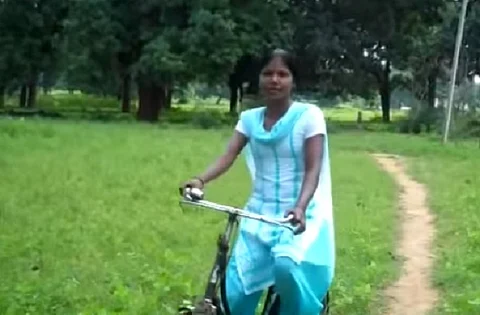

In a move that has made her a bit of a revolutionary trendsetter in Dantewada district, Chhattisgarh, Janadai Nag has broken the tradition of socially outcasting women when they have their period.
A video by posted on YouTube by VideoVolunteers, shows Janadai talking about challenging the menstrual taboos of her community in Purantarai village of Dantewada district. She says in the video that menstruating girls must go and hide in the nearby forest from daybreak to dusk.
The logic behind the practice is that she must not see the face of a man when she is menstruating. Even when she comes back to the house, she is made to stay in a hut behind the house which is put together with leaves and logs.
“In the jungle, there is fear of animals like tigers, bears and snakes, because there was neither any friend to accompany nor anybody who would visit. I had to stay alone in the dense forest, which was very risky,” Janadai says.
She says she was the first to break the repressive practice and has since become a role model for other teenage girls in the village. Not only has she dared to question the subjugation, she is also part of a women’s collective which tries to send the message out to other women. She added that so far, 5-6 girls chosen not to hide when they are menstruating.
Many communities follow different kinds of menstrual practices, many of which place restrictions on women and discriminate against them: They are not allowed to enter places of worship, not allowed to enter the kitchen or touch food and in some communities like the above, prohibited from interaction and human contact.
These beliefs are rooted in the fact that menstrual blood is considered impure and even cursed, making it a taboo. As a result, women are encouraged to hide the fact that they are menstruating by buying sanitary napkins in black bags or newspapers. A report by BBC stated that 75 percent of urban women in India still continue this practice.
The taboo and the tradition of secrecy and shame make the situation even worse for women in remote areas who may not have access to sanitary napkins or tampons. They often have to resort to sand, leaves and dirt, apart from old rags, which they are too ashamed to dry in the sun. Not only do practices like these place them at high risk of infections, but it had been found that 70 percent of reproductive illnesses in India are associated with bad menstrual hygiene.
Of late, the voices against menstrual taboo have grown. From the ‘Pads Against Sexism’ campaign in Jamia Millia Islamia, Delhi to the Supreme Court questioning temples’ decision to measure a woman’s purity against a natural bodily function – the incredulousness of the taboo is increasingly being scrutinized.
For others though, the defiance is still a far cry. However, cases like Janadai’s show that change begins at the smallest possible unit – in a remote tribal community where a lone girl dared to ask, “why must I hide?”